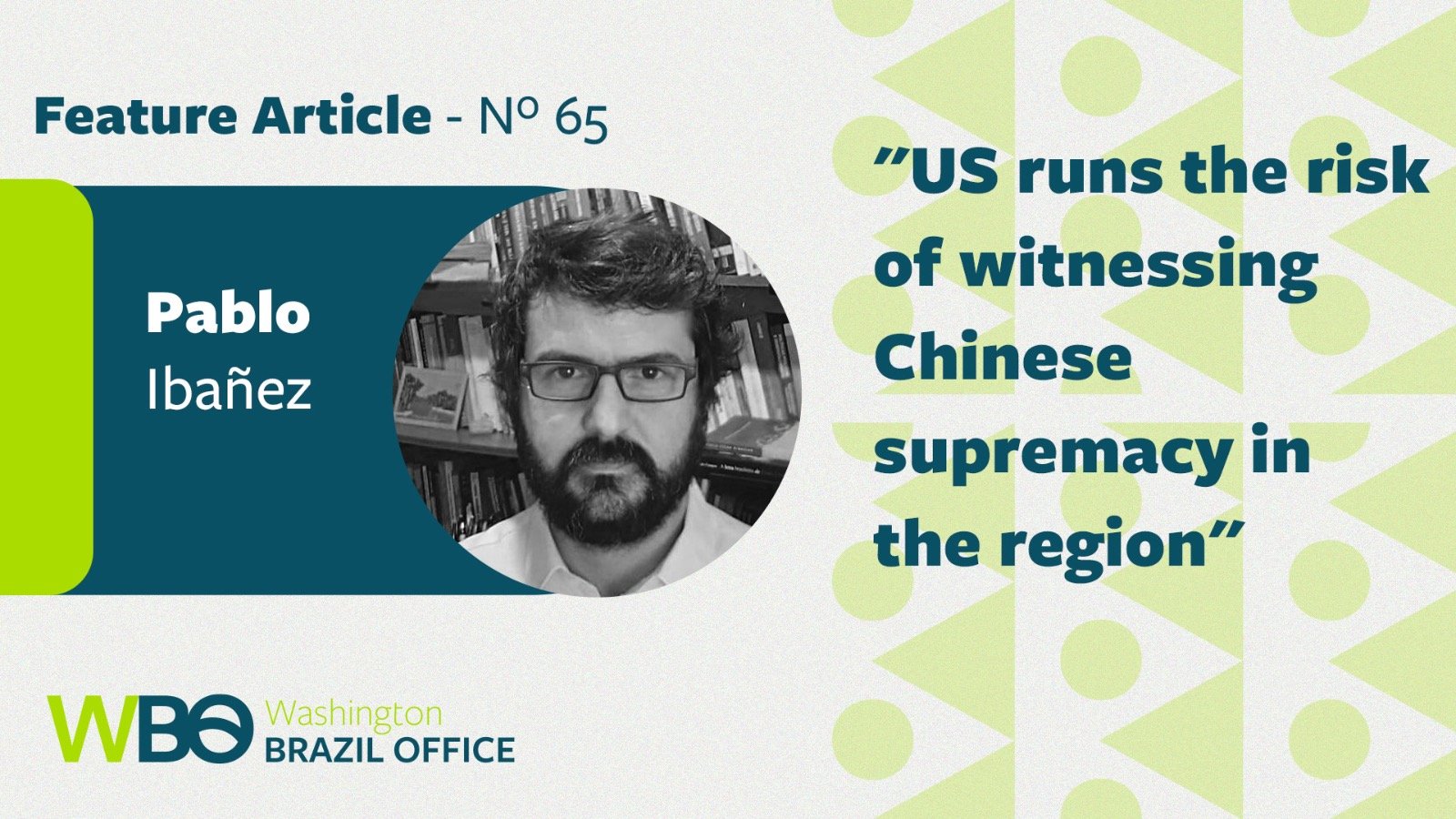The Centrality of the Regional Environment to the US in Relationship to Chinese Expansion
Pablo Ibañez has a doctorate in geopolitics from the University of São Paulo. He was a researcher at the Pan American Health Organization (OPAS), investigating the regionalization of health in the Amazon region. He was also a consultant to the Institute of Applied Economic Research (IPEA) in the evaluation of industrial and innovation policies. He has been a researcher at FUDAN University in Shanghai. At the time, he was responsible for analyzing the role of technological innovation in the expansion of the Belt and Road Initiative, the New Silk Road. He is currently an Adjunct Professor at the Federal Rural University of Rio de Janeiro, where he coordinates the Observatory of Asian Studies and participates in the Laboratory of Economic and Political Geography.
Lula's visit to China in April 2023 resulted in almost fifty agreements, many of which are in sensitive areas in technologies, such as aerospace, information, and communication (ICT). Common sense usually sees the Chinese presence in Brazil, as well as other countries in Latin America, based on its interests in areas related to agriculture, raw materials, and energy. The meeting seems to have made it clear, therefore, that the focus has evolved and now goes beyond the issues related to the export of primary goods to China.
The official note from the Chinese Embassy in Brazil explained something much deeper. In addition to not mentioning the agricultural sector, which has been consolidated due to Brazilian exports and the presence of Chinese companies in the production and acquisition of land in Brazil, and the further development of technology via ICT, there was emphasis on a future with greater participation in competitiveness, high-end added value, space technology, climate change (offshore wind projects, solar energy and hydrogen), low carbon innovation, biodiversity, the fight against hunger and poverty, and projects in the areas of education, tourism and culture. That is, China represents a spectrum of influence far beyond what we have today.
Members of the business sector are skeptical about the fulfillment of all of the signed agreements. On the Chinese side, much is said about bureaucracy and the difficulty of getting some of these goals off the ground. In relation to the Brazil, the main issue is that the Chinese do not fulfill everything they promise. Regardless of the two versions, the governments of both countries celebrated the beginning of a 'new era'.
The regional context, in turn, follows the same trend of the deepening presence of the Asian dragon. Direct investments in recent years have been massive and have been accompanied by diplomatic commitments to recognize “one China.” Most countries in the region have stopped recognizing Taiwan, including Panama. Now, even Paraguay, the last bastion, is studying the possibility of changing its position.
From an economic point of view, according to United Nations Conference on Trade and Development data for 2022, Chinese direct foreign investment in Latin America in recent decades has increased significantly, especially in Brazil. China's participation in the region had a slight decrease for the 2020-2022 period, but that doesn’t represent the previous upward trend, which, according to the survey, will tend to increase in coming years. Brazil did not follow regional patterns, as it recorded a 207% increase in Chinese investments in 2021 alone, with a focus on energy and ICT areas. In terms of trade, it is now the second largest partner in the region, second only to the United States.
Regarding South America in particular, in the last decade its member countries failed to carry out regional integration, due to local political and economic instabilities, something that has hindered the efforts undertaken since at least the 1990s. Therefore, today, there is no institution or regional authority that speaks for the whole. It is a relatively fragmented region in which the Chinese strategy is implemented on a case-by-case basis.
Among the factors that explain the increased Chinese presence in the region, the one that has emerged as significant is the ease of trade in basic products and its interests in strategic resources – energy, minerals, and agriculture. Added to this is the centrality that the New Silk Road Belt and Road Initiative has had in promoting agreements, investments and loans in infrastructure, which has promoted a massive participation of South Americans in the Chinese strategy. Brazil should soon sign the agreement, which will mean that only Colombia and Paraguay are not part of the arrangement. And the recent Paraguayan presidential debates have been guided by a discussion on whether or not to increase the Chinese presence in the local economy.
The issue of decreasing dependency on the dollar also gains greater importance. The Argentine case is the most serious at the moment, and discussions about the use of other currencies are increasing. In this regard, China stands out as a power in favor of exchanges in local currencies.
Since the 2000s, US geopolitics has focused on faraway regions. According to exponents of US strategic thinking, such as John Mearsheimer, Washington must position itself and act in an increasingly incisive way in the Asia Pacific. Even if they do so and leave aside a focus on areas of the world closer to home, they still run the risk of witnessing Chinese supremacy in the region.
China has demonstrated great institutional ability in adapting to the different socio-spatial realities of South America, even co-opting traditional US partners. This flexibility seems to be lacking in the United States, especially in the centrality it places of its international actions, which are always so distant from its neighbors. As the region is extremely lacking in infrastructure, technology, and essential environmental assets for current geopolitics, more assertive actions, based on feasible financing, could bring investments and a significant presence in the region consistent with effective demands. Maintaining a traditional position, given such an altered geopolitical reality, will not bring sensitive strategic benefits in the current complex international situation.

